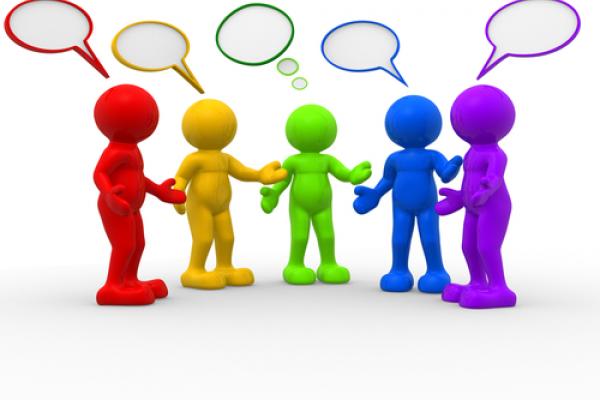It is difficult to discuss "hard topics" with people with whom I disagree.
When someone supports a political candidate whom I resist, holds to a theological understanding that I find confusing, or when I hear opposing points on climate change, poverty, global economics, human sexuality, etc., it is challenging to listen with a genuinely open ear.
However, what I have found is that, even if I feel passionate about a particular point of view, when I am able to open up and genuinely listen to others, great things take place throughout the exchange. Through honest and open interaction, an increased level of mutual respect and understanding is achieved, we learn to understand why things are perceived the way they are, and the overall strength of the relationship grows.
In our current North American climate of political polarization, religious division, and socio-economic seclusion, it is time to have more dialogue on — among other things — dialogue.
A friend of mine once said, “a true and genuine dialogue only takes place when each person is willing to be ‘converted’ to the other side of the argument.” At first I was skeptical of this remark, as I wondered how I could ever open myself up to being “converted” on certain topics about which I felt strongly. But now I am beginning to see the wisdom in such a statement.
When we discuss “tough topics” such as politics, religion, etc., the temptation is not to truly listen, but rather only to look for “holes” and/or “gaps” and “cracks” in the other person’s argument so that we can “charge back” with a strong opinion and thus show the other how they are holding an inaccurate view.
In my opinion, this is not “dialogue” or “discussion." It is instead “debate” or “dispute," and it ends up being more of an emotional fight that tears apart relationships than anything that resembles something constructive.
When it comes to debate, people are not truly “listening” as the other person speaks, but simply using those precious moments to formulate their next statement. On the other hand, if we put our guards down, allow ourselves to be vulnerable, and consider for a moment that the other person might have something worthwhile to offer (and thus something valuable we can learn), instead of “loading up” for our next argument, we offer a genuine ear, true dialogue, and a discussion takes place.
There are many topics in our world today that cause a great deal of division. People disagree about abortion, the death penalty, human sexuality, political affiliations, global economic policies, and of course — in a pluralistic world — many of us disagree about the nature of who Jesus is and what God does in and through the human race.
And to make matters worse, all too many television programs and radio broadcasts cash in by providing a platform for people merely to argue about these types of topics. My hope is that, instead of debating and fighting over who is “right” and who is “wrong,” we could open ourselves to the possibility of gathering around tables of true and genuine dialogue and discussion.
Instead of demonizing those who think and believe differently, or refusing to consider something new, why not value those who are unlike us and actually listen to what they have to say?
I believe that to surround ourselves only with people who think the same way we do is an easy temptation and a dangerous thing. While it takes boldness and courage to intentionally engage and listen to those who think differently, it is a true blessing to us all. Respectful discussion allows us to see the world through different eyes, and in the end, I believe God is able to do amazing things in and through the positive interactions.
People may be different from one another, but through conversation we are able to see our commonalities, value each other’s humanity, and work toward common progress.
And so, as the Earth continues to get “smaller” via the Internet, population growth, global travel, and other forms of globalization, whether we like it or not, we all will be faced with an increasing number of people who think, look, and act differently from what we always have known.
From inner city New York to the farmlands of Wisconsin, we find ourselves in a “salad bowl” of amazing diversity. As a result, instead of pointing fingers and immediately trying to get people to “act like us,” “talk like us,” and “look like us,” and thereby keep things “the way they always were,” my hope is that we would first learn to listen to others in a genuine manner, celebrate our diversity, and allow true and honest discussion to take place around tables of fellowship.
We should not shy away from the “tough topics” that too often divide us, but rather, reconsider how to discuss them, and move forward together. While we may not agree, hope abides that we may learn more about others and ourselves, and together consider how it is that we can live and serve side by side.
Brian E. Konkol is an ordained minister of the Evangelical Lutheran Church in America (ELCA), and doctoral candidate in Theology & Development with the University of KwaZulu-Natal (South Africa).
Image: CoraMax/Shutterstock
Got something to say about what you're reading? We value your feedback!
